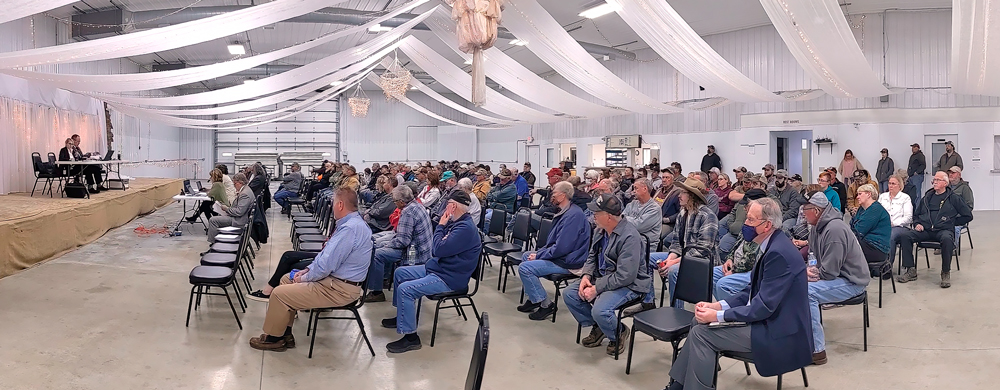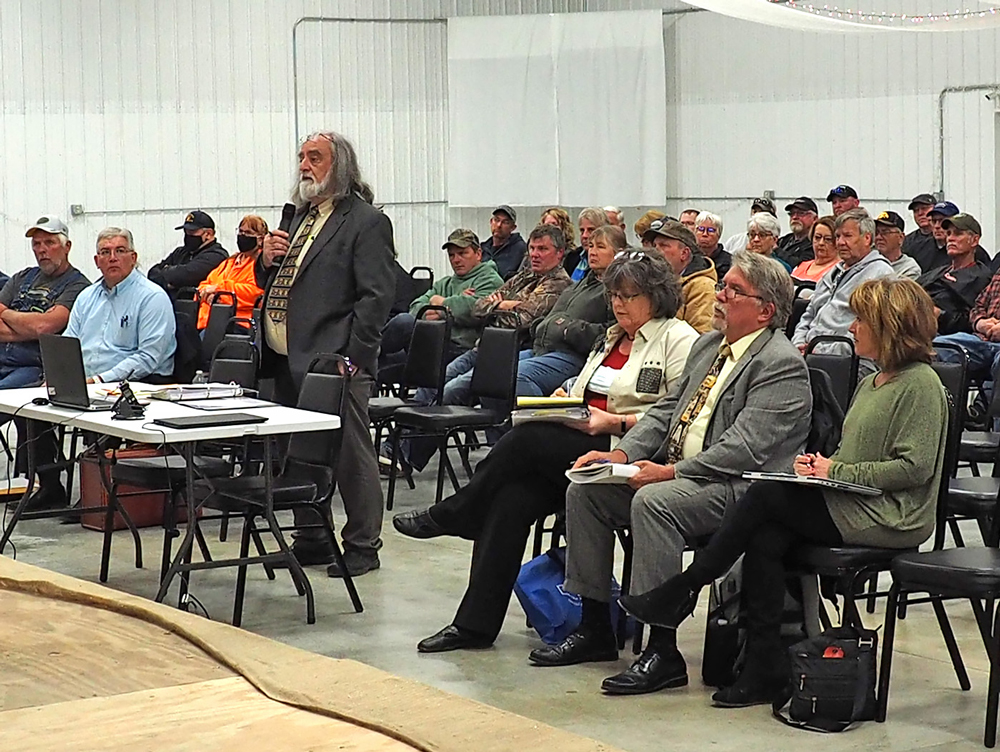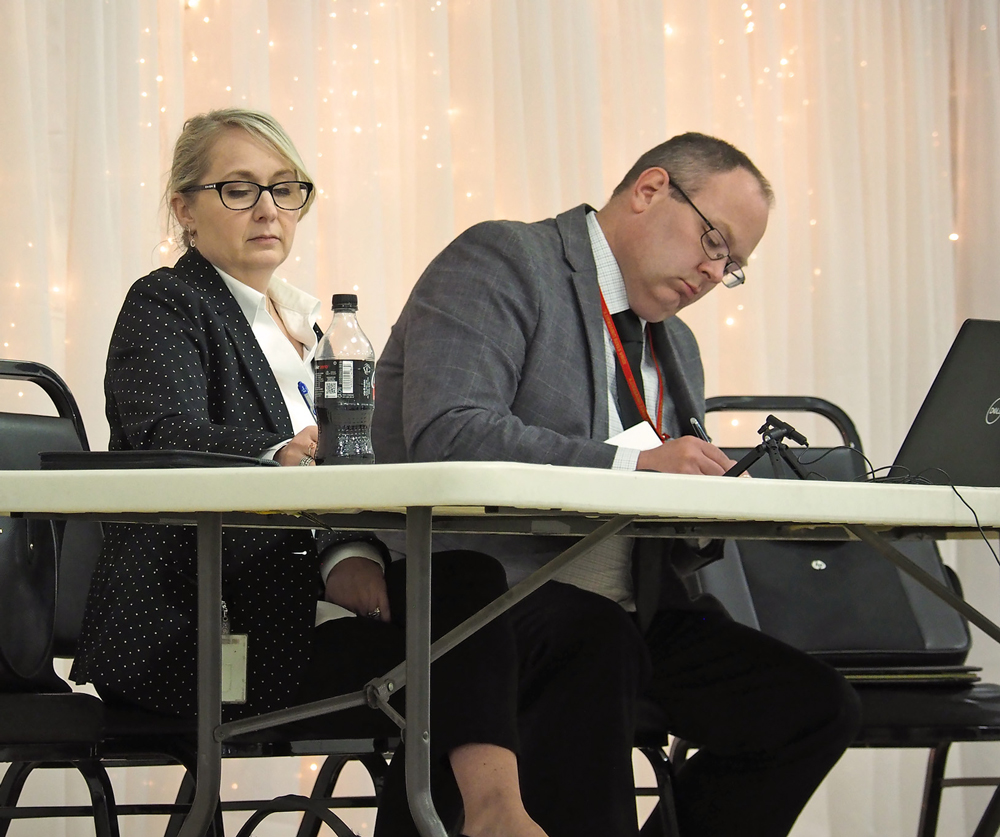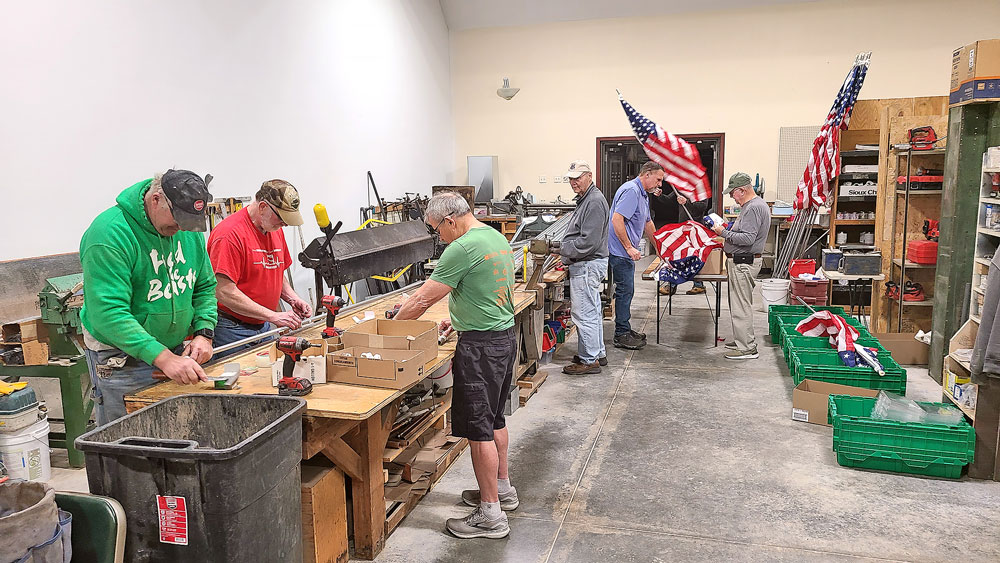Budget protest focuses on the county supervisors’ authority to spend money



By Bob Steenson, bsteenson@charlescitypress.com
The main question in the controversy over the cost of the Floyd County law enforcement center and courthouse updates project is whether the county Board of Supervisors had the authority to approve the project at a cost that was much higher than original estimates and higher than the $13.5 million in general obligation bonds that voters approved issuing in May 2018.
It was a decision that ultimately led to an increase in Floyd County property taxes for the new county fiscal year that will begin July 1 — one of the reasons more than 1,000 people signed a petition forcing a state review hearing that took place Monday night at Wrightz Auction Co., north of Floyd.
The results of that hearing could be the state ordering the county to reduce spending or reduce the amount of property tax collected, or both. Or it could be a determination that the supervisors acted within their authority and no changes are needed.
The decision of the State Appeal Board could be announced at a meeting June 7.
Attorney Michael Byrne of Mason City, representing the petitioners in his opening statement at the hearing Monday, said, “The obligation of the supervisors and the entitlement of the citizens is if this bond rate is insufficient at $13.5 million for the cost anticipated and to be spent by the county, then that matter must be resubmitted to the voters for approval.
“Otherwise the county and the board of supervisors should make such cuts as is necessary to provide for $13.5 million total bond expense and total charges to the taxpayers,” he said.
“There is nothing in the vote, the ballot, which indicates there will be any other source of income used for this project,” Byrne said. “The voters were entitled to know what their entire maximum expenditure was going to be in this project.”
Byrne said it has been difficult for the petitioners to find out where the extra $4½ million in project costs came from.
“This is not government in the people’s behalf,” he said. “The people have a right to clear representation and an explanation of where the additional costs arise. The obligation of the county here is, without specific approval of additional funds, to redirect the project, to cut costs and to spend only that amount of money approved.”
County elected officials say the $13.5 million was a limit on the debt the county could take on through bonding for the project, not a limit on project costs.
Their decision to go ahead with the project at the higher cost was in the best interests of the county because it needs a new jail and the courthouse needs updates, the officials have said.
Byrne also accused the supervisors of not giving county residents adequate information about what was being discussed at board meetings, using a “catchall” agenda item regarding discussion and possible action over LEC issues rather than specifically listing each change order or other decision that was being decided.
Supervisor Linda Tjaden, one of the people speaking for the county board, started the county’s opening statement saying, “The county is empathetic to the petitioners, as no one wants to pay higher taxes,” but she said the evidence presented to the State Appeal Board regarding county budgeting, and information about every change order and expense paid in the project would show the supervisors had acted correctly.
People may disagree with the decision, but it was the supervisors’ decision to make, board members have said.
Both the petitioners and the county sent statements and exhibits to the State Appeal Board before the hearing. The petitioners’ presentation was 54 pages long and the county’s was 147 pages.
The county explained that when it became apparent that the LEC and courthouse project would cost several million dollars more than the $13.5 million bonding limit‚ which was based on cost estimates from the project architects, the supervisors developed a plan to pay for the additional costs using money from the county’s general fund carry-over balance and several other sources.
County Auditor Gloria Carr, the other county spokesperson at the hearing, said during the county’s opening statement that additional funding included selling the second half of the general obligation bonds to take advantage of lower interest rates that had been anticipated.
“Northland Securities’ Jeff Heil presented to the board that ‘Interest rates projected at the time the county went to election in May 2018 were higher than today. The lower rates would allow the county to get more premium for the par amount of bonds and not raise the debt service levy higher than what was proposed,’” Carr said.
“This option allowed us to sell the $7.49 million bonds (which was the second of our $13.5 total issue) at a 5% coupon, netting $1,838,223 above the $13.5 million in bond proceeds to go toward the bid overage,” she said.
But Byrne said that the board had a fiduciary responsibility to issue the bonds at the lowest interest rate available, rather than issue them at a higher interest rate in order to get more money up front for the project.
“If there was a lower rate of interest available, the taxpayers were entitled to save that amount of money,” he said.
Carr said there is no prohibition in state or federal laws regarding premiums on bonds and it is a common practice of other government bodies.
“This allowed us to stay in the parameters of our debt levy rate, originally projected to be $1.08 per $1,000 of taxable value when we went to referendum,” she said.
Byrne also charged that the supervisors cut funding for other county departments “such as road use, maintenance, upkeep,” to help pay for the project, resulting in losses of services to county residents.
But Tjaden said the supervisors look at every department’s budget every year to determine an appropriate amount of funding. No department’s budget was cut for the coming fiscal year, except where the number of personnel was changed to meet changing requirements, and no department has said it will cut services, she said.
County Engineer Dusten Rolando, at the Board of Supervisors meeting Tuesday afternoon, agreed that the level of services he will provide for county roads next fiscal year will not be reduced.
He said it is misleading to compare specific funding sources within the Secondary Roads Department year to year because his funding comes from several sources, and spending can go up or down depending on how many big projects like bridges or paving are included in a particular fiscal year.
After the petitioners and the county each made 15-minute opening statements at the hearing Monday, the floor was opened to other groups and individuals.
Gordon Boge, president of the Coalition for Better County Government of Floyd County, said, “Everybody knows we need a new jail, I just don’t know that we need to be that far over budget.
“The hard-working people of this county deserve answers. Why is it so far over budget? It’s been a burden on the fixed income and the elderly and the farmers that have just started to get over a three or four-year struggle with bad prices,” he said.
Clair Rottinghaus of Charles City said he has “nothing but respect for our supervisors, … but as a business owner in Floyd County I just feel we’ve been run over by taxes. When we do a project … I hold the contractors accountable, and there’s no way I could go over budget that far off and not hold my contractors accountable.”
Brian Chatfield said, regarding getting up to $200,000 of the extra funds needed for the project from the Floyd County 911 Service Board to help pay for the new dispatch room in the LEC, “they got problems in communications and they’ve got no money because they’re stealing money out of that for the courthouse. There’s a lot of problems in the fire district that should be addressed.”
Roger Trettin of Rockford said there “needs to be accountability through the county on this budget,” and suggested that property tax assessments were increased this year to help pay for the LEC and courthouse.
Country officials have said that the assessment process through the county assessor’s office is determined by state law and the supervisors have nothing to do with setting property values.
Nate Knecht of Charles City said he was trying to refinance an acreage he had purchased, but the increased property taxes were going to force him to go from a 15-year note to a 30-year note to be able to make the payments.
Jim Frisbie, of Charles City, drew a laugh and applause from the audience when he said, “I’ve never been in jail, but I don’t understand why we have to furnish prisoners that are there a Hyatt Regency instead of a Motel 6. Most of those people have never paid any taxes so why do we have to give them the best of the world?”
Brian Gage of New Hampton, vice president of Mick Gage Plumbing and Heating, said if he knew 18 years ago when he moved the business to Charles City or 14 years ago when he built the building it is currently located in, what property taxes would be, he might have reconsidered the move.
Scott Andrews, a Charles City CPA, gave the petitioners’ closing statement, saying that the supervisors need to hold themselves fiscally responsible and he again asked for a special audit of the LEC and courthouse project.
Tjaden, concluding the county’s presentation, said the county had been told by the state that it needed a new jail and studies showed the 32-jail that is now almost completed was the best size.
“In unison, the board firmly believes it is in the best interest of the county to continue moving forward with the project,” she said, finishing the jail and making updates to the courthouse that will enable the 80-year old facility to continue being useful and to be operated more efficiently.
“It would be irresponsible to stop the project as suggested by the petitioners,” she said.
The State Appeal Board consists of Director of the Department of Management Michael Bousselot, Iowa Treasurer Michael L. Fitzgerald and the Auditor of State Rob Sand. Those persons will make any final decision, although representatives of their offices conducted the hearing Monday and will report their findings to the state officers.
The two state representatives at the meeting were Ted Nellesen and Carrie Johnson, with the Iowa Department of Management.








Social Share